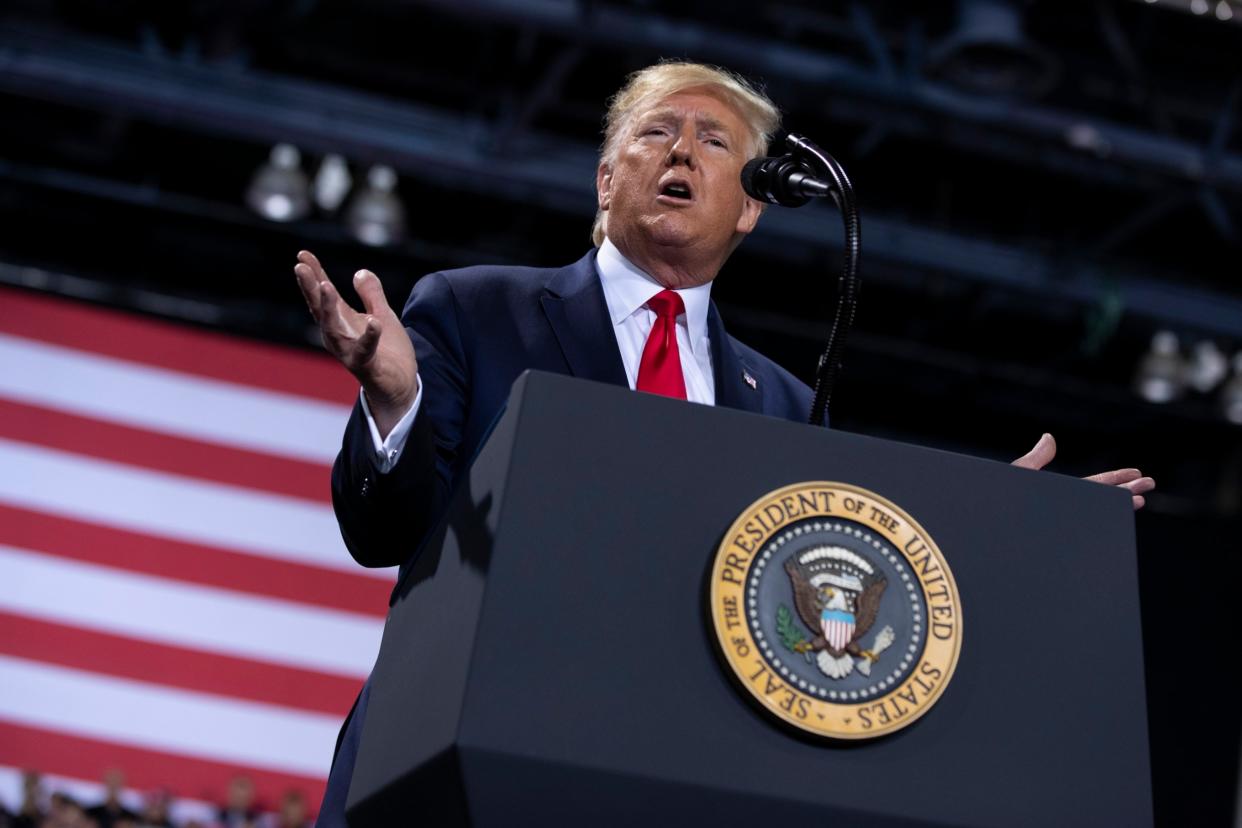What does Trump's impeachment mean, and what happens next?

Donald Trump’s impeachment is a black mark against his presidency of historic proportions, but it does not guarantee his removal from office.
That decision lies in the hands of the US Senate, the other half of the US Congress, which will consider the issue during a blockbuster trial in January.
Unlike in the House of Representatives, where a simple majority vote was enough to pass impeachment, two thirds of senators will need to vote to remove Mr Trump for it to happen.
That means 67 of the 100 senators must back the move. Given there are only 47 Democrats or independents, 20 Republicans would have to support removal, which looks very unlikely.
The trial itself, which has only ever happened for two other US presidents, will be a moment of epic political theatre and major consequence.

The Supreme Court’s chief justice – John Roberts, who was nominated by Republican president George W Bush – will sit as the judge for the trial.
The 100 senators will act as the jury, watching on silently as the case for and against convicting Mr Trump of the two articles of impeachment is put to them.
Among them will be five senators competing for the 2020 Democratic presidential nomination - Bernie Sanders, Elizabeth Warren, Cory Booker, Amy Klobuchar and Michael Bennet.

Making the case for impeachment will be a team of Democratic congressmen picked by Nancy Pelosi, the Democratic House speaker. Defending the president will be his lawyers.
How the trial will play out – the length, which witnesses are called, what rules of debate are set – is largely up for grabs, with few hard and fast parameters set by the US Constitution.
But here Mr Trump has one advantage – it is the Republicans who hold the majority in the Senate and so call the shots, providing their senators go along with the party leadership.
The US president was said to have initially favoured a lengthy trial where his supporters could vehemently lay out his defence and – it was hoped – convince new swathes of the country.

Some Republicans had lobbied for Democratic presidential hopeful Joe Biden and his son Hunter – the two men who Mr Trump wanted investigated by Ukraine, triggering impeachment – to give evidence.
Democrats have also been lobbying publicly for their own witnesses, including figures central to the Ukraine scandal who have not yet given evidence, such as Mick Mulvaney, Mr Trump’s acting chief of staff, and John Bolton, his former national security adviser.
However it seems the Republican senators, led by Senator majority leader Mitch McConnell, favour a short trial of around two weeks with no witnesses.
That would be markedly shorter than for the two other US presidents to have been impeached – Andrew Johnson, who had a 10-week trial, and Bill Clinton, whose trial lasted five weeks.
Neither Mr Johnson nor Mr Clinton appeared at their trial to give evidence in person – a precedent Mr Trump is expected to follow.

He will also be hoping for the same result. Neither Mr Johnson, who had replaced Abraham Lincoln after his assassination, nor Mr Clinton, a Democrat, were removed from office. Mr Johnson survived by one vote.
Not one of the 53 Republican senators has publicly said they will support removal. Some of those who have remained neutral in public, such as Utah senator and former presidential candidate Mitt Romney, have been hosted in the White House in recent weeks.
The country is split down the middle on impeaching and removing Mr Trump. Around 47 per cent of Americans support the move and the same proposition oppose it, with the rest having no opinion, according to a poll of polls run by the political website 538.
However opposition to impeachment among Republican voters is fierce, with nine in 10 being against removing Mr Trump in some polls.

That suggests Republican senators will hesitate before voting to remove, fearing a backlash from party supporters in their home states.
Should Mr Trump survive the trial without being removed – as is widely expected – he faces an uncertain next 11 months as he attempts to secure re-election.
No president has been impeached and gone on to win an election. Mr Johnson sought his party’s nomination again but failed. Mr Clinton bowed out after his second term ended two years later.
But that does not mean a slump in support is guaranteed. Mr Clinton, impeached for lying under oath about his affair with White House intern Monica Lewinsky, actually saw his approval rating increase after impeachment.
In Mr Trump's eyes, survival in the Senate trial will amount to vindication. The verdict of the American public will have to wait until November 3 2020.

